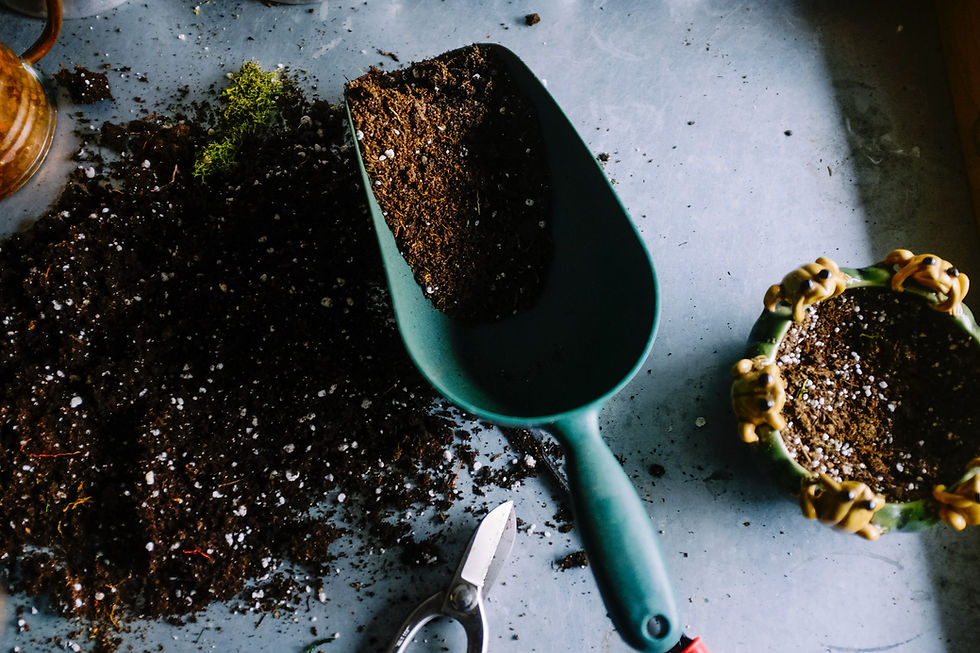How to Check and Adjust Your Garden soil pH Naturally Using Organic Matter
- djackson210
- Mar 14
- 3 min read
How to Check and Adjust Your Garden's pH Naturally Using Organic Matter
Maintaining the proper soil pH is essential for a thriving garden. If your soil is too acidic or alkaline, your plants may struggle to absorb nutrients, even with rich, organic soil. But don't worry—you can test and adjust your soil pH naturally using organic amendments instead of synthetic chemicals.
This guide will walk you through how to check your soil's pH and adjust it using organic matter so your plants get the nutrients they need to thrive.

Soil pH affects how well plants absorb nutrients. Different plants thrive in different pH levels:
Acidic soil (pH below 6.5): Ideal for blueberries, potatoes, azaleas, and rhododendrons.
Neutral soil (pH 6.5–7.0): Great for most vegetables and herbs like tomatoes, carrots, and basil.
Alkaline soil (pH above 7.0): Preferred by lavender, asparagus, and some brassicas like broccoli.
Even the best compost won't be fully adequate if your soil pH is off because plants can't take up key nutrients like nitrogen, phosphorus, and potassium.
Step 1: How to Check Your Soil's pH
Before adjusting your soil, you must test your pH levels to understand what changes (if any) are needed.
Option 1: Use a Soil pH Tester for Fast & Accurate Results
A pH tester like this one is an excellent tool for quick and precise readings. Just insert the probe into the soil, and you'll get an instant pH measurement—no strips, no mess. This is the most reliable way to track your soil pH over time.
Option 2: DIY Vinegar & Baking Soda Test (If You Don't Have a Tester)
If you want a rough idea of your soil's pH without a tester, try this simple home test:
1️⃣ To check for alkalinity (pH 7+):
Take a small handful of dry soil and place it in a cup.
Pour white vinegar over it.
If the soil bubbles or fizzes, your soil is alkaline.
2️⃣ To check for acidity (pH below 7):
Take another handful of soil and place it in a separate cup.
Mix it with baking soda and water.
If it bubbles, your soil is acidic.
This method does not give you an exact pH level, but it can help you determine if your soil needs to be adjusted.
Step 2: How to Adjust Soil pH Naturally
Once you know your soil's pH, you can adjust it using organic materials instead of synthetic chemicals.
How to Lower Soil pH (Make It More Acidic)
If your soil is too alkaline (above pH 7.0), these natural amendments can help:
🌱 Peat Moss – Mix it into the soil to gradually lower pH while improving moisture retention.
🍂 Compost or Leaf Mold – Organic matter releases natural acids that help lower pH.
🌲 Pine Needles or Oak Leaves – Spread these as mulch to naturally acidify the soil over time.
☕ Coffee Grounds – A mild way to slightly lower pH while adding nutrients.
🌾 Cottonseed Meal or Elemental Sulfur – Works slowly to reduce alkalinity (best for long-term adjustments).
How to Raise Soil pH (Make It More Alkaline)
If your soil is too acidic (below pH 6.0), try these organic methods to increase alkalinity:
🔥 Wood Ash – Sprinkling a light layer adds calcium carbonate, which helps raise pH. It is best for sandy soils but should be used sparingly.
🐚 Crushed Eggshells – Rich in calcium, they help neutralize acidic soil over time.
🪵 Biochar – A natural soil enhancer that boosts alkalinity and improves microbial life.
🥦 Lime (Dolomitic or Agricultural) – A classic way to raise pH naturally, though it works best when applied in fall or early spring.
Step 3: Maintaining Balanced Soil pH
To keep your soil healthy:
✅ Test Your Soil Annually – pH can shift over time, so recheck before planting season.
✅ Adjust Gradually – It's better to add organic matter in small amounts and test again before making significant changes.
✅ Mix Well – Always work amendments into the soil evenly to prevent pH imbalances.
✅ Water Smart – Hard (alkaline) water can raise pH over time, while rainwater is naturally slightly acidic.
Final Thoughts: Healthier Soil, Healthier Plants
Checking and adjusting your garden's pH naturally ensures that your plants get the necessary nutrients. Whether growing acid-loving blueberries or alkaline-loving lavender, organic amendments keep your soil fertile, balanced, and chemical-free.
Have you tested your garden's soil pH? What organic methods have worked for you? Share your experience in the comments!



Comments